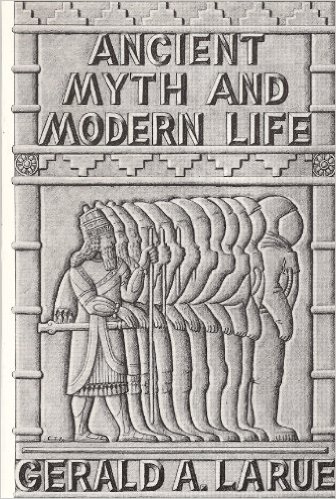
Ancient Myth and Modern Life
BY GERALD A. LARUE (PUBLISHED 1988 BY CENTERLINE PRESS. 230 pages)
Gerald Larue, who was professor emeritus of Biblical History and Archaeology at USC and for many years a highly regarded figure and author in the free thought community, was the author of several scholarly and informative texts relating to his field of expertise. Ancient Myth and Modern Life examines the roots of ancient religions and how their influence continues to be felt to this day.
Ancient Myth begins by differentiating the various kinds of myth, while informing us that the study of myth is a comparatively recent discipline, roughly paralleling the growth of archaeology. Larue (1916-2014) introduces mythic origins in ancient societies and their rapid acceptance as truth in the absence of science. He also describes eschatological mythology—tales about death, resurrection, immortality and the end of time, themes that remain cornerstones of most religious systems today. Each chapter closes with a commentary, discussing how these myths, in modern form, continue to exert influence, invariably detrimental, to today’s society.
Larue focuses on the ancient Near East to emphasize its importance in sharing present-day society. Though separated from us by thousands of years, the similarities between those societies and ours can at times be striking.
A key point to understand is that myth, almost without exception, always favors the ruling classes, thus encouraging—even forcing— the masses to yield to their authority. From this simple fact we are better able to comprehend subsequent Western philosophical writings and also why so many people even today tend to equate atheism with anarchy. Thus faith in god-myth equals faith in society, faith in the ruling class, and faith in Ronald Reagan, George W. Bush, and/or Barack Obama.
The section of societal myth is especially enlightening. Here, Dr. Larue presents the dysfunctional nature of religion, how it nurtures and promotes myth to ensure its survival and, in like manner, divides humanity by fostering an “us vs. them” mentality. Clearly, our history of warfare, death and destruction can be traced directly to the tendency of so many of our fellow humans past and present to think of their particular tribe as being the “chosen” one. Are we in the United States superior to the Russians, Cubans or Vietnamese merely because we have “In God We Trust” on our money?
All this underscores the importance of books such as this and the necessity of forcefully speaking out against unsupported theorems and mystical revelation. Freethinkers must be the “myth-busters,” for it is up to us to be educators and debunkers of supernatural hokum whenever it is encountered. Freethinkers must be at the forefront of a new age of enlightenment, emphasizing the importance of critical thinking, the scientific method, and intellectual honesty. Rejecting time-honored traditions and myths will no doubt ruffle some feathers, but that is their problem. Questioning so-called authorities is not anarchy, but merely humans using the one major quality that separates us from other sentient beings—our minds.
An invaluable book for the skeptic, Ancient Myth and Modern Life provides a rock-solid ideological base for us to demonstrate the incompatibility of unsubstantiated beliefs with the ideal of a more benevolent society.
Categories: Book Reviews
